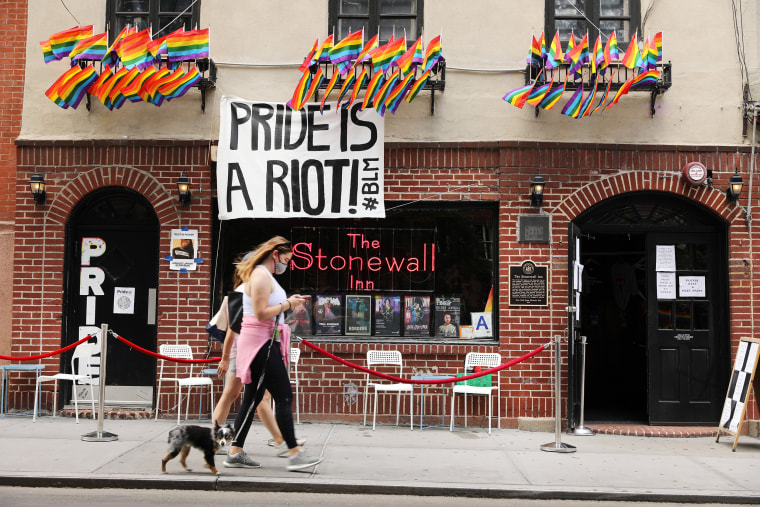Five decades ago, thousands of gay and transgender activists marched from New York City's Stonewall Inn to Central Park on the last Sunday of June. The 3-mile journey, honoring the first anniversary of the iconic 1969 Stonewall uprising, established a tradition of LGBTQ pride marches that would continue uninterrupted for 50 years and spread around the world.
The political and cultural changes that followed the first march a half-century ago — and the Stonewall rebellion against police harassment that preceded it — have changed the lives of millions of LGBTQ people. Same-sex marriage has been legal across the United States since 2015, the country has a record number of LGBTQ elected officials, and, as confirmed by a Supreme Court ruling this month, federal civil rights law bans workplace discrimination based on sexual orientation and gender identity.
And in many ways, social attitudes are ahead of the law. Five decades after people first paraded in the streets to shout out that they were proud to be gay, majorities of even doctrinally conservative religious groups support nondiscrimination protections for LGBTQ people, and many say they know someone who is gay, although fewer say they know someone who is transgender.
Laws and visibility, however, have gone only so far. LGBTQ people are the victims of a quarter of hate crimes, and violence continues to plague Black and brown transgender people in particular. The number of anti-LGBTQ hate groups is rising. The Trump administration has embarked on a systematic rollback of Obama-era pro-LGBTQ policies — including health care policies and religious exemptions — and has appointed a long list of judges with anti-LGBTQ track records.
Although the city canceled this year's official NYC Pride march because of the coronavirus pandemic, LGBTQ activists with the Reclaim Pride Coalition plan to stage an unlicensed, in-person protest march called the Queer Liberation March for Black Lives and Against Police Brutality, ensuring that on the 50th anniversary the streets where gay pride was born will be filled.
Heritage of Pride, the nonprofit that produces the official NYC Pride march, and other pride organizations around the world will host star-studded livestreaming events, including a rally, performances and a virtual march.
In a 2011 oral history project by SAGE, an advocacy group for older LGBTQ people, Jerry Hoose — a founding member of the radical queer rights group Gay Liberation Front who participated in the Stonewall uprising and the first Pride march — said the inaugural march, then called Christopher Street Liberation Day, was about coming out of the shadows after Stonewall and finding "pride in ourselves."
"We marched in the sunlight up to Central Park into the Sheep Meadow, proudly, in your face, and it was just a remarkable year," said Hoose, who died in 2015. "It was the year that changed our future and our history."
Download the NBC News app for breaking news and alerts
Hoose attributed LGBTQ advances to work in that crucial first year after Stonewall. "Right after the riot," he said, the "militant" activism that helped bring together the first Pride march was the most meaningful period of activism for the gay cause.
Some LGBTQ historians and leaders say the renewed focus on police brutality on the anniversary of the first Pride march shows that LGBTQ activism, and the event of Pride itself, is becoming more like it was 50 years ago.
"I don't think it will ever come back in the same forms," Lillian Faderman, author of "The Gay Revolution," said of past pride events. "It's just its natural evolution, and the present generation wants to do it differently from the way it's been done for the past 50 years."
Jon Boyd Carter, a Reclaim Pride organizer, downplayed the historic division between his group and the mainstream Pride parade, saying, "We are in a moment bigger than the differences held between queer organizations.
"We are in a moment where every American is being called upon to incorporate a new way of thinking about social justice into their everyday lives, and every person and organization that finds a way to authentically do that should be applauded and supported in that attempt," Carter said.
Ellen Broidy, a co-founder of the first Pride march and a former member of the Gay Liberation Front, applauded Pride Month's renewed intersectional focus.
"I'm thrilled to see all the young people, the diversity of the people, the intersectionality, people marching for a range of issues but keeping Black Lives Matter in the forefront," Broidy said, adding that the "gay liberation movement" of the '60s and the '70s that she and her contemporaries advocated for was intersectional before the word existed in this context.
"We always believed strongly in what we now call intersectionality, in that statement that none of us are free until all of us are free," Broidy said. "Also, the whole revolutionary idea was that none of us wanted a piece of the pie — we literally wanted to blow up the whole bakery."
In an interview last year for NBC News' "Stonewall 50: The Revolution" series, Broidy said, "The revolution did not happen." One year later, however, she has updated her view.
"We are in a whole new era now," she said. "Regrettably, it took death to bring it about, but there seems to be an energy in the streets.
"If people can keep this going, the revolution that failed to materialize in 1970 — in spite of the Black power movement, the anti-war movement, the LGBT movement, the women's movement — might just come into being now," she added. "I feel more optimistic than I have in a long time."





